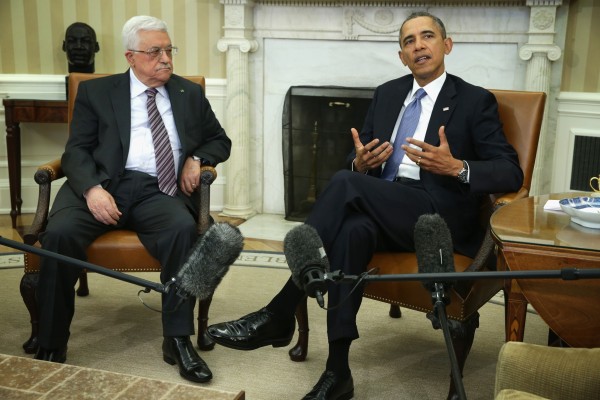Can We Afford To Erase Israel’s ‘Jewishness’?
April 2, 2014

As the Israeli-Palestinian conflict rolls into another year, a fresh round of U.S.-sponsored negotiations are being hammered out between the conflicting sides. The deadline for some kind of framework is the end of April, but support for a two-state solution is waning. A recent poll by the Foreign Policy magazine found that two-thirds of Americans would support a one-state solution with equal rights for Jews and Arabs in the event that the two-state solution (i.e. partition) fails.
A two-state solution is initially favored by only a plurality of those polled. Palestinian President Mahmoud Abbas has stated he would neither recognize Israel as a “Jewish state” nor accept the partition. Accordingly, negotiations over a two-state solution are not expected to end successfully. Adding to the bad faith of these negotiations, the cycle of terrorism, counter-terrorism and rocket strikes and retaliation remains unbroken, and as recently as March 22, three Palestinians were killed in an Israeli raid on a West Bank refugee camp in an attempt to apprehend a wanted Hamas operative. I do not believe a two-state solution will be successful, nor do I believe that the maintenance of Israel as a de jure Jewish state will be conducive to the peace process. The Israeli-Palestinian conflict is much more complex than a majority-minority dialectic. I think it would be impossible to create two uniform states out of Israel-Palestine, and their viability as sovereign states is highly questionable.
The immediate issue with partition is demography. Israel proper is almost one-fourth Arab, Christian and Muslim. These individuals have full citizenship rights within Israel and send representatives to the Knesset, the Israeli Parliament. Israel as a Jewish state, which it is legally, also raises larger questions about Jewish identity. Judaism is a religion and not an ethnicity, although there are ethno-religious groups associated with Judaism (Ashkenazim, Mizrahim, Sephardim and many more). Reducing these diverse groups to “Jews” is doing them a historical disservice in the name of Israel’s religious nationalism. Although most Israelis are fluent in the reconstructed language of Modern Hebrew, many have spoken and continue to speak the languages of their pre-Israeli ancestors, most notably, Russian and Arabic. More properly, Judaism, like Christianity, is comprised of many branches which are varied in beliefs and practices. The major categories include Reform and Orthodox, as well as the modern emergence of secular Jews, who identify more with a Jewish heritage or culture than religious observance. One sect, the Haredi, sometimes referred to as ultra-Orthodox, are known for their high fertility and unemployment rates and are a major concern to Israeli policy-makers. If such drastic distinctions can exist between Jewish Israelis, Israel’s claim to be a unitary Jewish state perhaps needs reevaluation. Pluralism would not be unique in the region; Lebanon, for example, has a mixture of Christian and Muslim denominations.
On the other side, we have the Gaza Strip and the West Bank, two exclaves of the Arab world administered by former Palestinian Authority, which the United Nations (UN) recognizes as the non-member state of Palestine. Being the inverse of Israel proper, these territories are roughly four-fifths Palestinian Arab and one-fifth Jewish. Most Jews in de jure Palestine live in settlements in the West Bank which are widely considered illegal under international law. However, many have lived there for generations, and deporting them would be unethical. The violent partition of India and Pakistan (a “Hindu state” and a “Muslim state”) in 1947 should serve as a reminder as to what population exchange is in practice.
There is also a substantial Palestinian refugee crisis in neighboring countries that such a move would worsen. The current Israeli government would never accept a partition that would leave their co-religionists under Palestinian rule, and Palestine would not accept the settlements any more if it were independent than it does now. It is also important to note that the West Bank and the Gaza Strip are neither connected nor would one be able to support the other. Non-contiguous countries do exist; Russia is separated from Kaliningrad, but Russia proper is a vast country while the latter is a minor province. However, creating an independent state out of the Palestinian territories would be like Utah and Alabama uniting and declaring their independence from the U.S.
Since partition is unfeasible, Israel must find a way to integrate Palestine. The synthesis of an Israel-Palestine state is the most beneficial solution in a religious and ethnically diverse land seeking to minimize future hostility. And, no, integration does not mean colonizing the West Bank. The settlements have greatly antagonized the Palestinians, who have lost substantial amounts of their de facto territory, and there will never be peace so long as this program continues. A one-state solution should respect Palestinian rights to the land of their ancestors and their right to equal legal status in both Israel and Palestine, the latter perhaps having its own autonomous institutions as is common for provinces in many European federal states.









